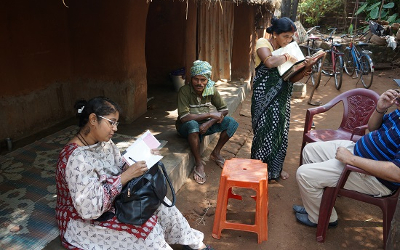AKIPRESS.COM -  The digital revolution arrives in remote Indian villages such as Akbarpur by communication methods old and new: a WhatsApp message buzzes through to the village chief; he notifies his fellows via megaphone, reports The Guardian.
The digital revolution arrives in remote Indian villages such as Akbarpur by communication methods old and new: a WhatsApp message buzzes through to the village chief; he notifies his fellows via megaphone, reports The Guardian.
The world’s biggest biometric ID programme is coming to town.
The next day, two men arrive at the village in Palwal district, Haryana state, with devices the residents have never seen: an iris scanner, a fingerprint machine, a camera and laptop. They are here to register the people of Akbarpur.
The officials set up an enrolment centre at the village chief’s house. For three days, queues snake around the courtyard. Some of those who come are afraid the iris scanner will hurt their eyes; others do not understand why they need to be enrolled.
According to the latest figures in May 2016 from the Unique Identification Authority, more than a billion people have been given Aadhaar numbers. Within the next few months, the details of every person in India will be in the government database.
The government’s task is enormous. India’s 1.25 billion population is second in size only to China. Hundreds of officials have been enlisted to go out to register people and give them a unique identification number, which will be linked to their biometric data.
Currently, many welfare schemes are run by individual states, often allowing corruption and fraud at the local level. The national database will allow the central government to take stock of the population’s needs in various parts of the country and provide services accordingly.
Dr Ajay Bhushan Pandey, director general of the Unique Identification Authority, says the programme will transform India. “Each person will be given a biometric non-duplicable ID. This kind of exercise has never been attempted on this scale anywhere. If a person wants to access any government service, they will need to use their Aadhaar number.
The data collected by the Aadhaar centres will be stored in a network of servers in the southern city of Bangalore. Information from the database can then be circulated to different authorities. The ID system, according to the government, will prevent welfare fraud and ensure subsidies and social security schemes are reaching the right people. Millions of people under the scheme will also get access to bank accounts for the first time.
